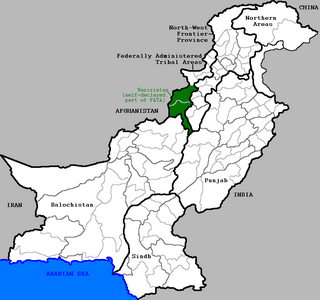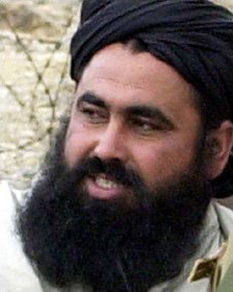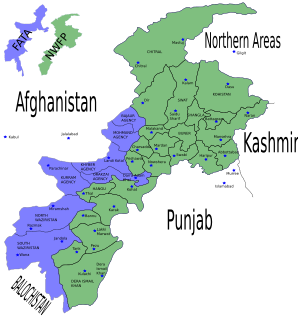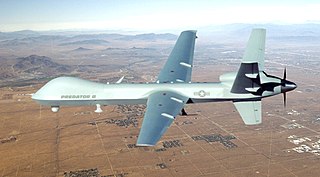Related Research Articles

The Islamic Movement of Uzbekistan was a militant Islamist group formed in 1998 by Islamic ideologue Tahir Yuldashev and former Soviet paratrooper Juma Namangani—both ethnic Uzbeks from the Fergana Valley. Its original objective was to overthrow President Islam Karimov of Uzbekistan and create an Islamic state under Sharia; however, in subsequent years, it reinvented itself as an ally of Al-Qaeda. The group also maintained relations with Afghan Taliban in 1990s. However, later on, relations between the Afghan Taliban and the IMU started declining.

Waziristan is a mountainous region covering the former FATA agencies of North Waziristan and South Waziristan which are now districts of Khyber Pakhtunkhwa province of Pakistan. Waziristan covers some 11,585 square kilometres (4,500 sq mi). The area is populated by ethnic Pashtuns. It is named after the Wazir tribe. The language spoken in the valley is Pashto, predominantly the Waziri dialect. The region forms the southern part of Pakistan's Federally Administered Tribal Areas, which is now part of Khyber Pakhtunkhwa province.

Abdullah Mehsud was a militant commander who killed himself with a hand grenade after security forces raided his dwelling in Zhob, Balochistan, Pakistan. He belonged to the Mahsud tribe.
Terrorism in Pakistan according to Ministry of Interior, poses a significant threat to the people of Pakistan. The current wave of terrorism is believed to have started in 2000 and peaked during 2009. Since then it has drastically declined as result of military operations conducted by the Pakistan Army. According to South Asian Terrorism Portal Index (SATP), terrorism in Pakistan has declined by 89% in 2017 since 2009.

Nek Muhammad Wazir was a prominent Pakistani mujahideen or jihadi leader. He was killed in a US drone strike in South Waziristan, FATA, Pakistan in 2004. This was the first CIA drone strike inside Pakistan.

Baitullah Mehsud was a leading terrorist in Waziristan, Pakistan, and the leader of the Tehrik-i-Taliban Pakistan (TTP). He formed the TTP from an alliance of about five militant groups in December 2007. He is thought by U.S. military analysts to have commanded up to 5,000 fighters and to have been behind numerous attacks in Pakistan including the assassination of Benazir Bhutto which he and others have denied.

The 1996–2001 Afghan Civil War took place between the Taliban's conquest of Kabul and their establishing of the Islamic Emirate of Afghanistan on 27 September 1996, and the US and UK invasion of Afghanistan on 7 October 2001: a period that was part of the Afghan Civil War that had started in 1989, and also part of the war in Afghanistan that had started in 1978.

General Ehsan ul HaqNI(m), HI(m), OKA, LOH, is a retired four-star rank army general in the Pakistan Army and a public official, served as the Chairman of the Joint Chiefs of Staff Committee, appointed in October 2005 until his retirement in 2007.

The Islamic Jihad Union is a militant Islamist organization founded in 2002 as a splinter group of the Islamic Movement of Uzbekistan (IMU). Headquartered in North Waziristan, a mountainous region of northwest Pakistan, bordering Afghanistan, the group has been affiliated with both Al-Qaeda and the Taliban.

The insurgency in Khyber Pakhtunkhwa, also known as the War in North-West Pakistan, is an ongoing armed conflict involving Pakistan, and Islamist militant groups such as the Tehrik-i-Taliban Pakistan (TTP), Jundallah, Lashkar-e-Islam (LeI), TNSM, al-Qaeda, and their Central Asian allies such as the ISIL–Khorasan (ISIL), Islamic Movement of Uzbekistan, East Turkistan Movement, Emirate of Caucasus, and elements of organized crime.

Tehrik-i-Taliban Pakistan, alternatively referred to as the Pakistani Taliban, is a Pashtun Islamist armed student group that is an umbrella organization of various student militant groups based along the Afghan–Pakistani border. Most Taliban groups in Pakistan coalesce under the TTP. In December 2007, about 13 groups united under the leadership of Baitullah Mehsud to form the TTP.

The Miramshah airstrike took place on Friday 12 September 2008 in Miramshah in North Waziristan in the Federally Administered Tribal Areas (FATA) in Pakistan. It was part of a series of attacks targeting presumed militants, and was carried out by a United States Air Force drone aircraft. It took advantage of the power vacuum in Pakistan, following the fall of Pervez Musharraf on 18 August 2008. The missiles hit two buildings – in one three women and two children were killed, and in the other seven Taliban militants died.

The Haqqani network is an Afghan Islamist guerrilla insurgent group, built around the family of the same name, that has used asymmetric warfare in Afghanistan to fight against Soviet forces in the 1980s, and US-led NATO forces and the Islamic Republic of Afghanistan government in the 21st century. It is considered to be a "semi-autonomous" offshoot of the Taliban. It has been most active in eastern Afghanistan and across the Durand Line in north-west Pakistan.

The Operation Rah-e-Nijat was a strategic offensive military operation by the unified command of Pakistan Armed Forces against the Tehrik-i-Taliban Pakistan (TTP) and their extremist allies in the South Waziristan area of the Federally Administered Tribal Areas that began on June 19, 2009; a major ground-air offensive was subsequently launched on October 17. It became the integral part of the war in Western fronts which led to the encirclement and destruction of Taliban forces in the region, although the Taliban leadership escaped to lawless areas of neighboring Afghanistan.
Hafiz Gul Bahadur is the leader of a Pakistani Taliban faction based in North Waziristan. Upon the formation of the Tehrik-i-Taliban Pakistan (TTP) in December 2007, he was announced as the militant group's overall naib amir under Baitullah Mehsud, who was based in South Waziristan, but has largely distanced himself from the TTP due to rivalries with Mehsud and disagreements about the TTP's attacks against the Pakistani state.
Events in the year 2014 in Pakistan.

On 8 June 2014, 10 militants armed with automatic weapons, a rocket launcher, suicide vests, and grenades attacked Jinnah International Airport in Karachi, Pakistan. 36 people were killed, including all 10 attackers, and 18 others were wounded. The militant organisation Tehrik-i-Taliban Pakistan (TTP) initially claimed responsibility for the attack. According to state media, the attackers were foreigners of Uzbek origin who belonged to the Islamic Movement of Uzbekistan (IMU), an Al Qaeda-linked militant organisation that works closely with TTP. The TTP later confirmed that the attack was a joint operation they executed with the IMU, who independently admitted to having supplied personnel for the attack.

Operation Zarb-e-Azb was a joint military offensive conducted by the Pakistan Armed Forces against various militant groups, including the Tehrik-i-Taliban Pakistan (TTP), the Islamic Movement of Uzbekistan, the East Turkestan Islamic Movement, Lashkar-e-Jhangvi, al-Qaeda, Jundallah and the Haqqani network. The operation was launched on 15 June 2014 in North Waziristan along the Pakistan-Afghanistan border as a renewed effort against militancy in the wake of the 8 June attack on Jinnah International Airport in Karachi, for which the TTP and the IMU claimed responsibility. As of 14 July 2014, the operation internally displaced about 929,859 people belonging to 80,302 families from North Waziristan.
The Operation al-Mizan was a series of strategic military campaigns conducted by the Pakistan army and 10,000 United States special operations forces from 2002 to 2006. It continued for five years in various phases eventually, several other operations including, the Operation Carlosa II. Al-Mizan was the first major operation of Pakistani troops to combat foreign militant outfits in North Waziristan of North-West Frontier Province. An estimate of 70,000 to 80,000 troops were deployed in affected areas.
References
- ↑ US Seeks to Heal Rift Between Key Anti-Terror Allies 26 September 2006
- 1 2 Gul, Pazir (6 September 2006). "Waziristan accord signed". Dawn . Retrieved 19 September 2006.
- ↑ Shahzad, Syed Saleem (2 September 2006). "The knife at Pakistan's throat". Asia Times Online. Archived from the original on 19 October 2006. Retrieved 12 September 2006.CS1 maint: unfit URL (link)
- ↑ President Bush and President Musharraf of Pakistan Participate in Press Availability 22 September 2006
- ↑ Imran Khan: Musharraf is Bush's poodle 8 September 2006 Times Now
- ↑ "Pakistan 'Taleban' in peace deal". BBC. 5 September 2006. Retrieved 19 September 2006.
- ↑ "Pakistan vows to help crush Taliban". The Age. 7 September 2006. Retrieved 7 September 2006.
- ↑ A battle lost By Tony Blankley The Washington Times 27 September 2006
- ↑ Pakistan Surrenders, The Taliban control the border with Afghanistan by Daveed Gartenstein-Ross & Bill Roggio - The Weekly Standard Busin 10/02/2006, Volume 012, Issue 03
- ↑ "Pakistan gives in to tribesmen". Taipei Times. AFP. 27 April 2004. Retrieved 29 February 2020.
- ↑ "A Pro-Taliban Threat". Archived from the original on 13 May 2008.
- ↑ "Waziristan truce went wrong: Gen Ehsan". Dawn. 3 November 2007. Retrieved 19 March 2018.